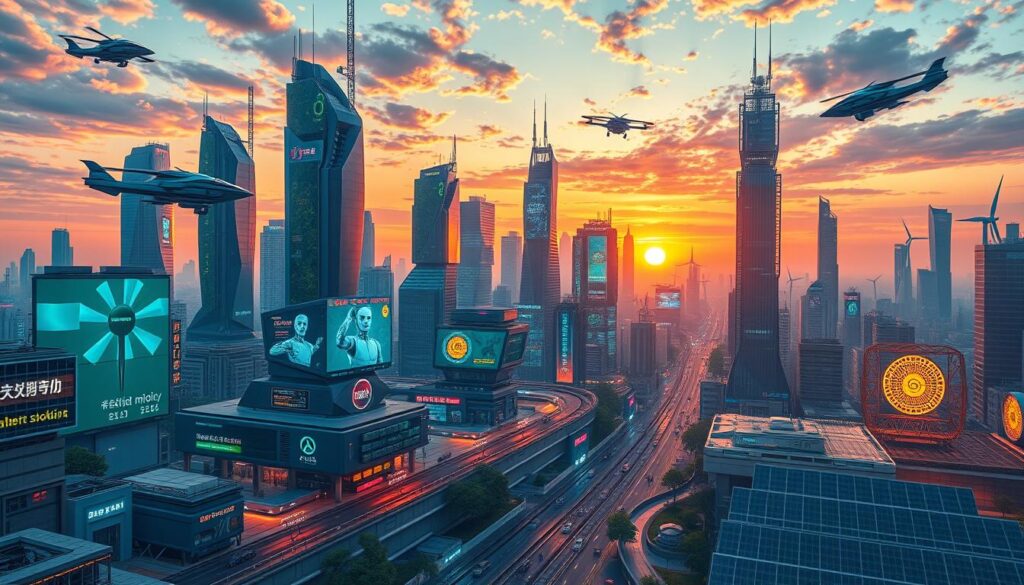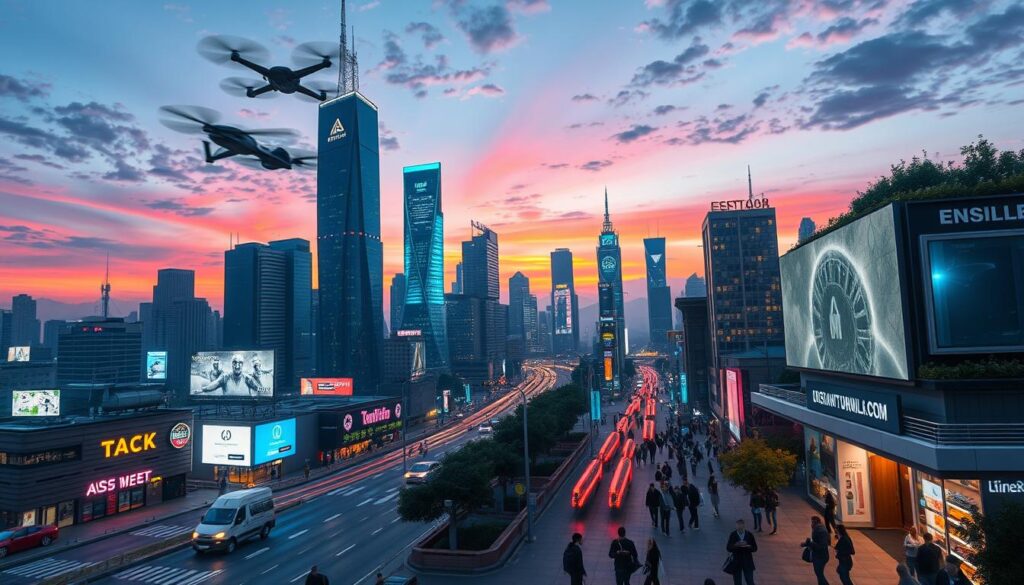Emerging technologies are changing how we live, work, and connect. They bring new solutions to many industries. This makes our lives easier and more efficient.
Artificial Intelligence (AI) in healthcare can diagnose diseases faster and more accurately. AI-assisted surgeries can lead to faster recovery times for patients. These technologies are making a big difference.
AI in public transportation could cut waiting times by 15% and energy use by 10%. AI in shipping can also improve efficiency, lowering costs by up to 20%.
Technologies like AI are set to boost productivity in many industries by at least 40% in the next decade. This is thanks to automation and better decision-making. As we invest more in AI, we’ll see even more changes in healthcare, education, and transportation.
The Digital Revolution: Understanding Today’s Technological Landscape
The digital revolution has brought cutting-edge advancements in tech. It has led to digital transformation and changed old ways of doing things. Now, we have better access to information, which helps us grow and learn.
Today, social media has over 4.7 billion users worldwide. This shows how it helps us talk to each other fast. The e-learning market is set to hit $375 billion by 2026. This growth is thanks to online learning and digital tools.
Key Drivers of Technological Change
- Automation and Artificial Intelligence might take 85 million jobs by 2025, says the World Economic Forum.
- Virtual and augmented reality are set to grow to a $209 billion industry by 2022. They’re changing education big time.
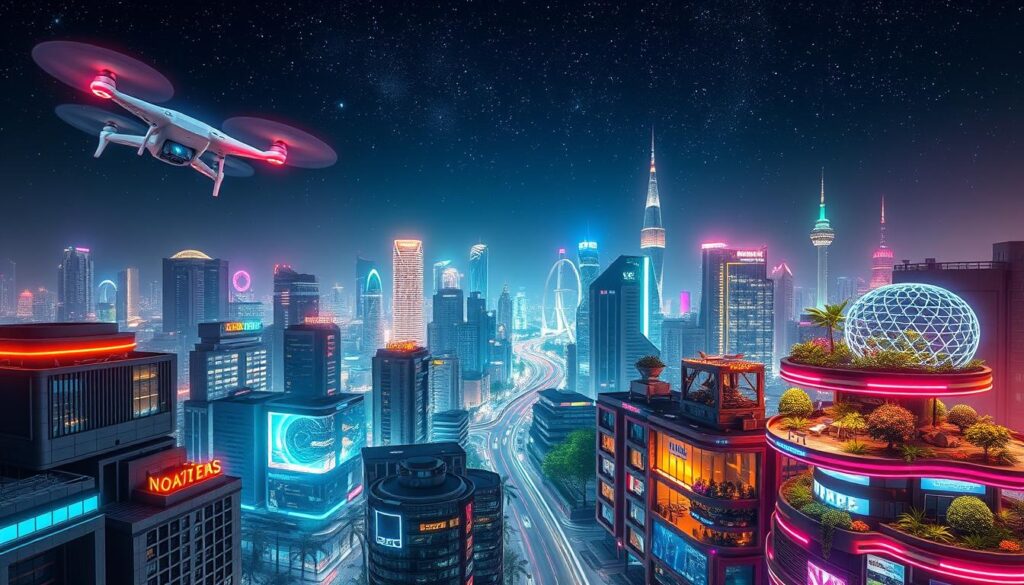
Impact on Global Industries
The digital revolution has changed many industries. Retail now has online shopping and custom experiences. Healthcare uses telemedicine and looks at data to diagnose.
| Industry | Digital Transformation |
|---|---|
| Retail | E-commerce, personalized shopping experiences |
| Healthcare | Telemedicine, data-driven diagnostics |
| Finance | Fintech solutions, seamless transactions |
Current State of Innovation
Now, we see a lot of disruptive tech like blockchain, AI, and IoT. These new techs are making businesses better. They help companies work smarter, faster, and focus more on what customers want.
Artificial Intelligence and Machine Learning: Reshaping Business Operations
Artificial intelligence (AI) and machine learning are changing business operations. They offer next-gen solutions and breakthrough inventions. This is transforming how companies handle different tasks.
Now, 35% of companies use AI, and 42% are looking into it. It’s becoming key in business strategies.
Machine learning is used in many fields like finance, healthcare, and e-commerce. For example, in finance, AI helps spot fraud by looking for unusual activity. In healthcare, it helps doctors by comparing images to thousands of others.
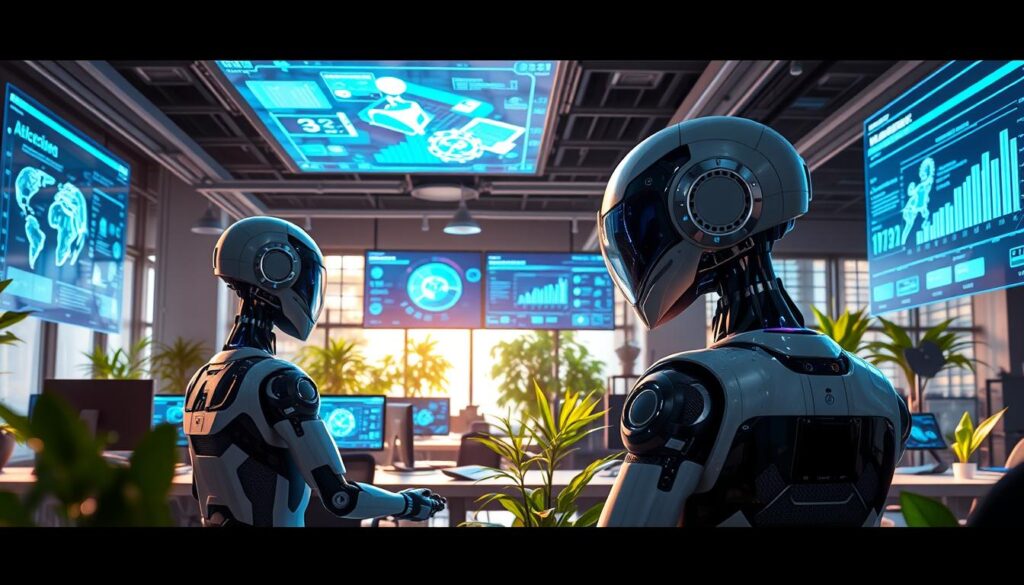
- Fraud detection and prevention
- Personalized recommendations and customer service
- Predictive maintenance and quality control
- Automated recruitment and hiring processes
These innovations help businesses grow and stay ahead. They make operations more efficient.
As AI and machine learning get better, we’ll see more changes. The global machine learning market is expected to grow a lot. It shows AI and machine learning are here to stay.
Blockchain Technology: Beyond Cryptocurrency Applications
Blockchain technology is changing many industries, not just for cryptocurrency. It helps companies save money and work more efficiently. For instance, banks spend a lot on ‘Know Your Customer’ (KYC) projects. But, using blockchain could make these processes faster and cheaper.
Blockchain also makes things more secure and clear. Smart contracts and decentralized systems cut down on fraud and hacks. Data stored on blockchain is safer than on old servers. It also helps lower fraud in transactions.
Industry-Specific Implementation Cases
- Dubai aims to become a fully integrated blockchain city by 2020.
- Estonia has developed a ‘digital republic’ by shifting many national systems onto the Ethereum blockchain.
- Chile utilizes Ethereum to track finances and data from its energy grid, increasing transparency and combatting corruption.
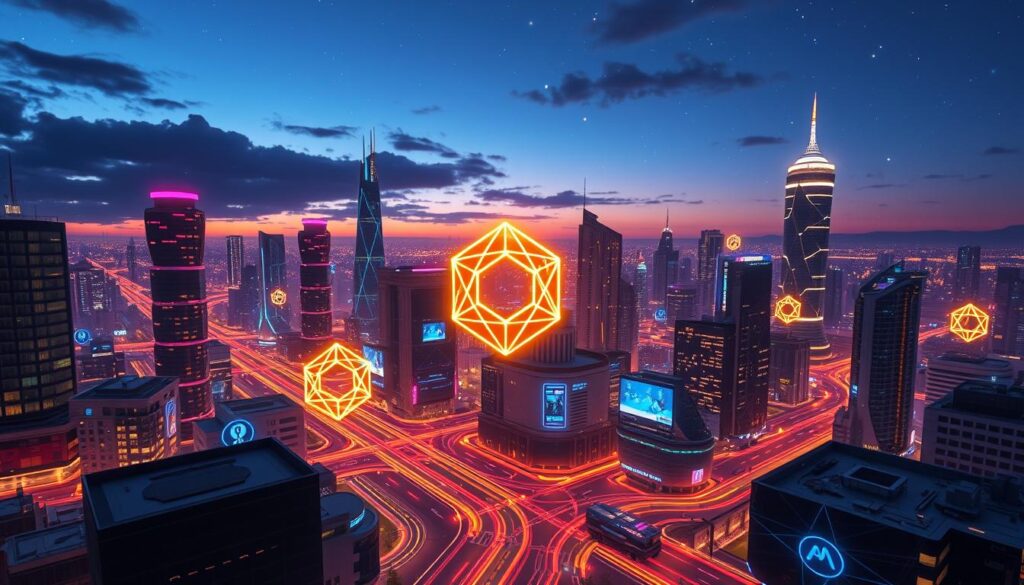
These examples show how blockchain can change industries and open new doors. It solves real-world problems and grows fast. With blockchain, companies can save money, work better, and keep things safe and open.
Emerging Technologies in Healthcare: A Revolution in Patient Care
Healthcare is changing fast thanks to futuristic developments in tech. New tech like artificial intelligence and the Internet of Medical Things (IoMT) is changing how we care for patients. Now, doctors can check on patients from afar and act fast if something goes wrong.
Wearable devices and IoMT let us keep an eye on important health signs all the time. This helps catch health problems early. Virtual reality (VR) and augmented reality (AR) are also being used. They help train doctors and teach patients about their treatments.

- Patients get better care that’s just for them
- Doctors can make more accurate diagnoses with machine learning (ML)
- Healthcare gets more efficient thanks to automation
As healthcare keeps using cutting-edge advancements, we’ll see even better care for patients. The future looks bright with things like easy data sharing, virtual tours, and treatments that fit each person’s needs.
Quantum Computing: The Next Frontier of Processing Power
Quantum computing is a new tech that can solve problems way faster than old computers. It’s changing how we do things and making some old ways seem outdated. This tech can tackle problems that old computers can’t even try to solve.
Many companies, like those in finance, healthcare, and logistics, are putting a lot of money into quantum tech. For instance, IBM’s Condor processor has 1,121 qubits, showing big steps forward in quantum tech. Quantum tools are helping find cures for diseases like Parkinson’s and Alzheimer’s, making drug development faster and cheaper.
Some big uses for quantum computing are:
- Helping with finance by making investment plans better and safer
- Speeding up finding new medicines in healthcare
- Improving how goods are delivered and managed in logistics
Quantum computing is going to change many areas, like finance, healthcare, making things, and helping customers. As it gets better, we’ll need more people to work with quantum data, like data analysts.
Overall, quantum computing is a disruptive tech that could change many industries and help with digital transformation. It can solve hard problems and do lots of math at once, making it a tech to keep an eye on.
| Industry | Application | Benefit |
|---|---|---|
| Finance | Portfolio optimization | Improved investment strategies |
| Healthcare | Drug discovery | Accelerated drug development |
| Logistics | Optimized delivery routes | Reduced costs and improved efficiency |
Internet of Things (IoT): Creating Connected Ecosystems
The Internet of Things (IoT) is changing how we live and work. It connects devices and sensors, forming networks that share data. This makes our lives easier and more efficient.
The IoT market is expected to hit $1.1 trillion by 2026. It will grow by 24.9% each year from 2021 to 2026. This growth comes from new tech like artificial intelligence and machine learning.
IoT has many uses, including:
- Smart cities, where sensors manage traffic and energy
- Industrial IoT, improving production and maintenance
- Consumer IoT, making homes and health tech better
IoT could add up to $6.2 trillion to the economy by 2030. As tech keeps improving, we’ll see more cool IoT uses in the future.
| Industry | IoT Application | Potential Benefit |
|---|---|---|
| Manufacturing | Predictive maintenance | 20% reduction in downtime |
| Healthcare | Patient monitoring | 30% reduction in hospital readmission rates |
| Retail | Customer engagement | 5-10% increase in revenue |
Sustainable Technology: Green Innovations Shaping Our Future
Sustainable technology is solving environmental problems with next-gen solutions and breakthrough inventions. It changes how we think about sustainability. Renewable energy, clean tech, and tracking environmental impact are key.
Waste-to-energy conversion is a great example. It cuts down landfill waste and offers new energy. Precision agriculture also saves water and cuts down on fertilizers by a lot. New tech like floating solar panels and concentrated solar power is getting more popular. They make electricity more efficiently and use less land.
About 80% of people want to buy from companies that care about the planet. The green bond market is growing fast, reaching around $500 billion. This shows how important sustainable finance is for green projects and breakthrough inventions.
| Technology | Impact |
|---|---|
| Waste-to-energy conversion | Reduces landfill waste and provides alternative energy sources |
| Advanced precision agriculture | Reduces water usage by up to 50% and fertilizers by 30% |
| Floating photovoltaics | Minimizes land space consumption and enhances electricity generation efficiency |
Overcoming Implementation Challenges in Modern Tech Integration
Bringing new tech into the mix can be tough, but it’s also a chance to grow and innovate. Cutting-edge advancements and digital transformation are within reach. A recent survey found that 54% of people struggle with “Resistance to change” when introducing new tech. Another 21% face “Integration” issues.
Why do people resist change? It’s often fear of losing their jobs, being comfortable with old ways, or not seeing the benefits. Lack of training and cultural barriers also play a part. To beat these hurdles, companies can start small, offer training, and foster a culture of new ideas.
Some big names have successfully integrated tech into their systems. T-Mobile used Salesforce, Purdue University went with Brightspace, and Netflix switched to microservices. These moves have made decision-making better, customers happier, and work more efficient.
Here are some key challenges and how to solve them:
- Resistance to change: provide training and support
- Integration: adopt gradual implementation strategies
- Cost: prioritize investments in emerging technologies
- Expertise: develop skills and knowledge in cutting-edge technologies
By tackling these issues and embracing cutting-edge advancements and digital transformation, companies can find new ways to grow and succeed.
| Challenge | Solution |
|---|---|
| Resistance to change | Provide training and support |
| Integration | Adopt gradual implementation strategies |
| Cost | Prioritize investments in emerging technologies |
| Expertise | Develop skills and knowledge in cutting-edge technologies |
Charting the Path Forward: The Next Decade of Technological Evolution
The next decade will see huge changes in technology. We’ll see big steps in artificial intelligence and blockchain. Quantum computing will also play a big role, changing how we work and live.
Companies that use new tech will lead the way. They’ll make things better, work smarter, and give customers what they want. We’ll see smart cities and green tech that will change our world.
Leadership and a culture of innovation are key. A diverse team is also important. By working together and staying up-to-date, businesses can grow and stay ahead.

